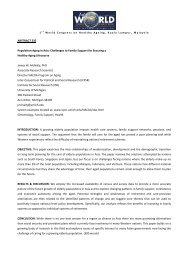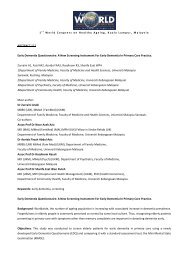The Pseudodementia Dilemma - 1st World Congress on Healthy ...
The Pseudodementia Dilemma - 1st World Congress on Healthy ...
The Pseudodementia Dilemma - 1st World Congress on Healthy ...
Create successful ePaper yourself
Turn your PDF publications into a flip-book with our unique Google optimized e-Paper software.
DPD (c<strong>on</strong>’t)<br />
• Jacoby and Levy observed larger ventricles in elderly<br />
depressives (1980) and decreased brain absorpti<strong>on</strong><br />
density (1983) as compared to c<strong>on</strong>trols – thus, ageing<br />
processes affecting the brain, i.e. cerebral neur<strong>on</strong>al<br />
loss and neurochemical c<strong>on</strong>comitants of depressi<strong>on</strong><br />
lead to cognitive failure<br />
• View strengthened by Abas et al (1990) of 70% of 20<br />
elderly depressives having cognitive impairment and<br />
up<strong>on</strong> recovery from depressi<strong>on</strong>, a third were still<br />
cognitively compromised - in line with thoughts of<br />
depressi<strong>on</strong> being a harbinger of dementia as elderly<br />
depressives were at increased risk of developing<br />
dementia (Post, 1962), as well as figures from Reding et<br />
al (1985) when more than half of 28 depressed and n<strong>on</strong>demented<br />
patients became demented 3 years later















